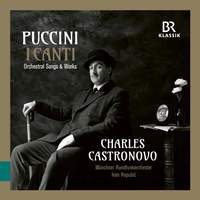Recording of the Week,
Puccini Songs from Charles Castronovo
It makes perfect sense. Puccini’s song output spans almost his entire career - and like several other composers primarily known for their operas, he often sowed seeds there which would eventually come into full bloom on stage. There’s material here which later found its way into Le Villi, La bohème, La rondine and most notably his first big hit Manon Lescaut – where a melody from the student composition ‘Mentìa l'avviso’ was upcycled as Des Grieux’s ‘Donna non vidi mai’.
As Schachtner points out in his booklet-note, many of these songs do sound as if they were intended to be orchestrated at some point, and throughout the album it feels as if he’s simply bringing out colours which were already hiding in plain sight. You’d be hard-pushed, I think, to find anything here which couldn’t pass as authentic Puccini, though there’s never any sense that Schachtner is simply phoning things in: in ‘Sole e amore’ (which the composer described as ‘the first germ of Bohème’), he takes his cue from the text itself rather than merely replicating what Puccini does when he puts the same music into the mouths of Mimì and Rodolfo in a very different emotional context seven years later…
And even in songs which Puccini never recycled for the stage, Schachtner is adept at tapping into hues and textures which suggest a certain kinship with later works: the high woodwind chorales in the early ‘Salve Regina’ (originally intended for organ) transport us to the rarefied sound-world of the convent in Suor Angelica, whilst the sombre orchestral clothing of ‘Terra e mare’ calls to mind the brooding atmosphere of the Parisian docks in Il tabarro.
What a treat it is to have Castronovo as the main event on an album – now in his late forties, this glamorous American tenor is almost a quarter of a century into a career which has included Rodolfos and Cavaradossis at some of the world’s major opera-houses, and it’s always been something of a mystery to me as to why he’s never been snapped up for a solo contract with one of the big record-labels. The voice itself is lustrous and virile, with bronzy baritonal tints that might call to mind his younger contemporary Jonathan Tetelman, and Schachtner’s orchestrations provide him with ample opportunity to let it rip in all its glory: that invitation to ‘sing at full power’ in ‘Canto d’anime’ could stand as an epigram to the album as a whole.
Exuberant, declamatory songs such as the swashbuckling ‘Avanti, Urania’ (written to celebrate the launch of a friend’s new steam-ship) and the invocations to Diana and Rome suit him especially well, all crowned with ringing high notes which had me wondering if Castronovo might soon add heavier Puccini roles such as Des Grieux in Manon Lescaut and Luigi in Il tabarro to his repertoire. But there’s charm and delicacy too, notably in the tender lullaby ‘Sogno d’or’ (which Puccini revisited four years later in La rondine) and the folksy ‘Casa mia’ – so brief that you can listen to the entire thing via our sound-sample!
The programme also includes scintillating accounts of two orchestral works composed during Puccini’s studies at the Milan Conservatory: the rather Wagnerian Preludio sinfonico and the Capriccio sinfonico (if I may question the master, surely this is really the ‘first germ of Bohème’?). Pucciniphiles should also keep their eyes peeled for Carlo Rizzi’s accounts of these two works (plus his own symphonic suites on Tosca and Butterfly) next month and for Angela Gheorghiu’s recital of the songs in their original versions in a few weeks’ time, but Castronovo and Repušić have certainly set the bar high.
Charles Castronovo (tenor), Münchner Rundfunkorchester, Ivan Repušić
Available Formats: CD, MP3, FLAC, Hi-Res FLAC




